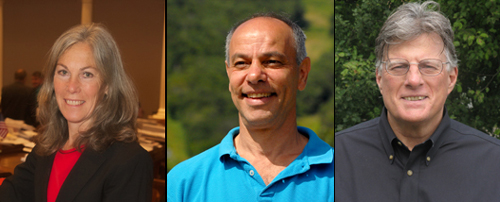
On Wednesday, October 3, the Mad River Rotary Club invited the candidates running for representative seats in the newly created Washington 7 District of the Vermont Legislature to speak at its morning meeting.
The three candidates currently campaigning for the district’s two open seats are Maxine Grad (D-Moretown), Adam Greshin (I-Warren) and Sal Spinosa (I-Waitsfield). Both Grad and Greshin have currently served in the Legislature under different districts, before the towns were regrouped and Warren, Fayston, Waitsfield, Moretown and Duxbury became known as Washington 7. This is Spinosa’s first time running for district representative.
Before they took turns to respond to questions from the audience, the candidates each had 10 minutes to introduce themselves.
Greshin, who spoke first, outlined three “core values” that he believes have helped him through his last legislative term: valuing communication, building credibility at the State House and maintaining a “passion for public policy” that helps him to persevere through meticulous lawmaking sessions.
Grad, who spoke next, referenced several specific laws she helped pass during her time on the Judiciary Committee that reflect those issues she feels are most important, such as a highway safety bill that includes a cellphone ban and curfew for new drivers, “because I know what it’s like to be a parent of a 16-year-old who just got their license,” Grad said. If re-elected, Grad will also continue to prioritize childcare and elementary education, health care and energy policies.
And Spinosa, who spoke last, explained how his experience working as a trial lawyer in the public sector in California and as head of the enforcement division for the Vermont Agency of Natural Resources (ANR) have prepared him for a position in the state Legislature. According to Spinosa, issues relating to sexual assault, welfare fraud and environmental consumer protection “are all issues on which I can be immediately conversational when I walk through the doors [of the State House] on my first day,” he said.
When asked about their positions on certain issues in the question-answer section that followed, all three candidates more or less agreed that Act 60, which seeks to increase equal educational opportunities between rich and poor towns regardless of their property tax revenue, is an important initiative but needs to be reworked. The problem, according to Greshin and Grad, is not where the money is coming from but how the schools are spending it.
When asked about their positions on physician-assisted suicide for patients with terminal illnesses (an issue that arose in the state’s last bill), again, all candidates said that they support the premise. “It’s a worthy discussion,” Spinosa said, and he believes the bill could pass despite the “massive range of moral and ethical considerations that it raises.”
Candidates were asked what they felt was the most important state issue, and why?
From the conversations he’s had with voters during his campaign, Greshin believes that one of the most important issues is that of “affordability,” as many people who have lived in Vermont their entire lives are currently having trouble keeping up with the state’s increasingly high cost of living. “Every debate and decision we have has to be filtered through the prism of affordability,” Greshin said.
For Grad, the most important state issue right now is health care, which “is one way to help affordability,” Grad said, as many Vermonters are currently paying too much for coverage. Thus, Grad plans to focus on developing a state health care system that is “accessible, affordable and provides quality care.”
Spinosa believes that the development of alternative power is the most important issue currently facing the state, because it will affect a number of different arenas. “If we make an institutional commitment [to alternative power], we will see all other things mentioned here today fall into place,” Spinosa said.





